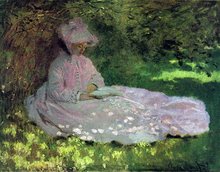I know Katie said she preferred this novel to The Good Earth. I disagree. I found The Good Earth to be gripping, emotional, interesting. I am sorry to report I cannot use any of those words to describe Snow Flower and the Secret Fan. Because it lacked those characteristics, among others, this book was difficult for me to read.
The themes author Lisa See explored were viable: friendship, betrayal, family dynamics, poverty. She even described some fascinating (if not bewildering) customs: foot-binding, marriage customs in China of the era, medical remedies. (I admit I skipped quickly over the pig-butchering. It didn't sit well with my breakfast. No bacon, but still....) In the end, though, I found that I just didn't care.
A good novel starts and ends with characters I either love or relate to on an emotional level (Elizabeth Bennett, Sally J. Friedman). They tell funny anecdotes, endure heart-breaking situations, and are witty, intelligent, and moral. I neither loved nor related to Snow Flower or Lily. It's possible it's because they "lived" in a country 6,000 miles away nearly 200 years ago. More likely, the characters were not "real" enough -- or likable enough -- for my tastes. Something kept me too distant from them. I am picturing Lily as she almost robotically performs her duties, especially as the new Lady Lu.
As for Snow Flower, though there were hints here and there about her wanting to "fly off," her actions did not corroborate her feelings. As the story unfolds, we learn she was more trapped in her situation than we were led to know at the beginning. Still, I did not find a lot of emotional depth within her. I am willing to listen to an argument that the setting was, in part, at fault. Snow Flower could hardly have flown off anywhere given her poor situation during that era. But I can't help thinking a better novelist could have given Snow Flower more dynamism.
The fact that there are very few real discussions in the book -- mostly just recollections -- also kept me feeling distant from the events and people. Never "hearing" Lily's husband speak was one example of a relationship that meant nothing to me. Was the author also telling us that the relationship meant nothing to Lily either? It's hard to tell.
The slow, cumbersome story-telling kept the novel from being more gripping. It took so long to get to the point. If the author was trying to build up the "before" to make us really understand how good things used to be between Snow Flower and Lily, then she erred on the side of quantity over quality. So many scenes seemed extraneous: sitting up in the ladies' chamber, Lily's older sister's marriage problems, each detail about the secret women's writing.
In addition to the dearth of compelling characters and forward-moving story-telling, the book was plain depressing! Sad story after sad story: Spring Moon's death, foot-binding, marriage to strangers, no mother-daughter love, poverty, civil unrest, opium addiction, miscarriage. The author might have made the book more readable had she imbued a little more sunshine and humor. Just because a book reflects the realities of the time does not mean there is nothing to laugh at.
This book gave me very little to smile about. I don't call it a waste of time; it had its value, especially in its descriptions of the customs of the time. Other than that, Snow Flower and the Secret Fan could fly away as if it were one of a pair of mandarin ducks, and I would not be worse off for it.
Wednesday, January 9
Subscribe to:
Post Comments (Atom)

1 comment:
I understand your detachment. I guess I felt that way too, but I still connected a bit to each of their situations, how their hands were tied to change their circumstances.
I think the author was trying to use some psychology behind Snow Flower's obsession with birds and flying away. Something that the most unhappy dream of doing. I did admire her courage NOT to commit suicide, to follow her mother's example in that way. Snow Flower had a lot of courage, courage that a large majority of women of that time had to grip onto for their children's sake (and of course their family's honor).
Post a Comment